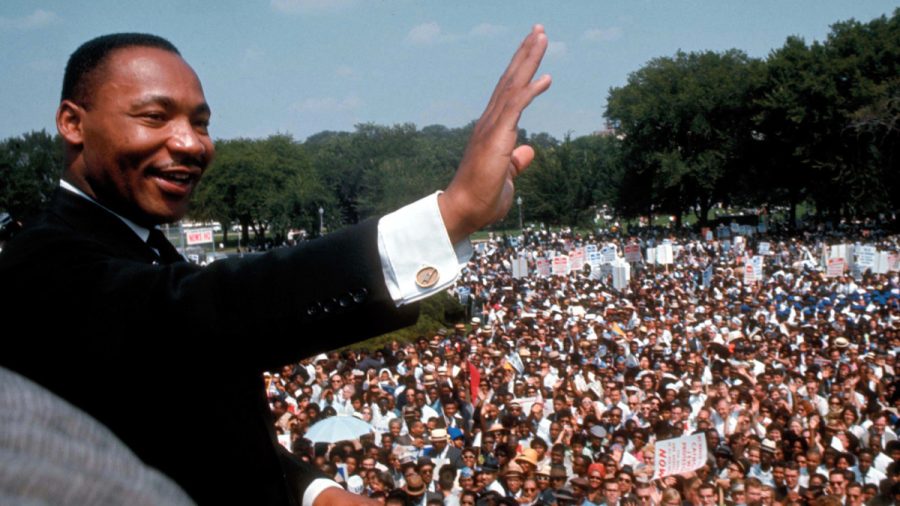A Day of History, Service, and Celebration: Martin Luther King Day
“We shall overcome because the arc of the moral universe is long, but it bends toward justice.” – Dr. Martin Luther King Jr.
Francis Miller/Time & Life Pictures/Getty Images
Martin Luther King speaks to a crowd at the 1963 March on Washington
January 23, 2023
On a late April afternoon in 1968, America’s greatest civil rights leader, Dr. Martin Luther King Jr. was assassinated on his Memphis hotel room balcony. Grief, mourning, despair, and outcry instantly followed, as the Civil Rights movement, and the United States itself, had lost a truly great leader. Almost immediately, the cry began to memorialize King’s legacy through a day of service, action, and remembrance–that would become Martin Luther King Day. Yet this day had a rocky road to implementation in the nation, and was often met with controversy.
Four days after King’s death, Michigan Congressman John Conyers proposed a bill to celebrate a holiday in King’s honor. However, it attracted little attention or support for a main key reason–Martin Luther King was far from popular amongst the halls of Congress, or in the nation as a whole. It may seem easy to forget now, but King was viewed as one of the most hated men in America going into the late 60s. An early 1968 poll found that around 75% of Americans disapproved of King, largely due to his increasingly outspoken views on the Vietnam War, and continued push for racial equality.
Many white Americans viewed the effects of segregation as solved by the Civil Rights Act and Voting Rights Act in 1964 and 1965, respectively, but King continued to push for economic reforms, investment in neglected black communities, fair housing, and workers’ rights, aimed at benefiting African Americans and poor whites. King also extended his focus from the South to Northern cities like Chicago and Detroit, holding a mirror up to the more racially liberal North to say that they too, built up racism. And the Vietnam War’s outbreak inspired King to come out as a tireless voice for peace and against the U.S’s involvement in the war, once stating that it made little sense to send black men “eight thousand miles to guarantee liberties in Southeast Asia which they had not found in Southwest Georgia or East Harlem.” Overall, his views grew more and more uncomfortable for many Americans happy with the status quo, despite the fact that King was in the right.
It was all of this that made the push for a day to commemorate King controversial for many of that generation. It would take 11 years from King’s death to even get a vote for the Holiday, celebrating King’s January birthday, on the House floor, as Congress needs to vote on federal holidays to put them into place. Even then, the measure couldn’t pass. This effort did inspire a larger cultural movement around the holiday, as many black communities had already been celebrating the holiday regardless of what the federal government did or did not say. Now, they rallied to make the day a formal holiday. Celebrities and musicians, particularly Stevie Wonder, raised public awareness and sentiment for the fight, holding a march in Washington and a number of other rallies. A six million people-petition, one of the largest in United States history, was submitted to Congress, further pushing the issue into national consciousness.
As a result of the push, the House passed the bill establishing the holiday in 1983. In the Senate, it passed after a controversial debate, and moved on to then-president Reagan’s desk, who signed it into law. Reagan, like many of his colleagues, initially opposed the bill, but saw the public demand for it and acquiesced. Many Congressmen still held out, however (some of whom are still serving in the United States government 40 years later), as did a number of states. Many states recognized the holiday along with the federal government, giving state workers the day off in addition to existing federal workers. However, other states watered down the direct association to King by celebrating all civil rights movements, or postponed labeling it a holiday for as long as possible. Alabama and Mississippi even decided to celebrate Robert E. Lee Day in their states on the same day – in commemoration of the Confederate general who betrayed the United States, fought for the preservation of keeping human beings as slaves, and lost a four year civil war over 100 years before. Not exactly someone who’s legacy is on the level as King’s. And yes, this holiday is still in effect. Needless to say, King’s legacy was still met with resistance years after his death.
Regardless of the official status of Martin Luther King day in each state, Americans, particularly in the black community, have continued to celebrate the day to honor King’s legacy of fighting against racism, prejudice, and hatred in the nation. It is the only holiday that asks Americans to treat it as a day of service, so all people can educate themselves on King’s legacy and issues, and fight for them in their own community. Right here in the South Bend area, a number of events took place as well, most notably the 37th annual Martin Luther King Jr. celebration downtown, which featured a breakfast, numerous speakers, singers, prayers, and poets, and a march from the County City Building to the Century Center. It’s a great way to connect with the community and honor Dr. King’s work, and all should attend if they’re able next year.
King’s tireless work to change the United States was often met with backlash, ignorance, or just plain old hate. But his message of nonviolence, equality, and respect for all people’s human dignity, no matter who they are or what they do, is something that God calls all of us to stand up for and embrace. With Martin Luther King Day just passed, let us all strive to fulfill this message.


